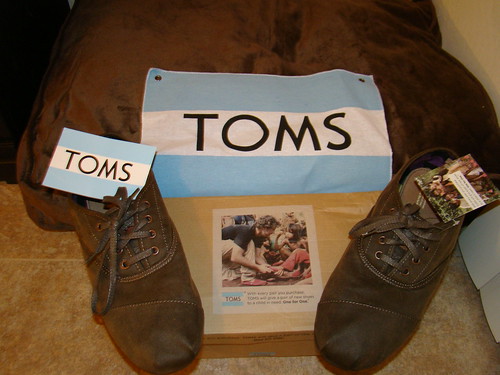TOMS shoes: half-assed aid & a bad deal???
I’ve written about the problem with TOMS and their critics and about TOMS recent big announcement: selling sunglasses.
Courtney Martin, author of Do It Anyway: The New Generation of Activists, takes the TOMS criticism to the glossy pages of the American Prospect magazine and even quotes me in the process:
Others argue that it’s important to see TOMS, and the businesses it has inspired, as baby steps in public awareness. Kelsey Timmerman, the author of Where Am I Wearing? A Global Tour to the Countries, Factories, and People That Make Our Clothes, writes: “The problem isn’t shoelessness. The problem is poverty. … If every person who slips on a pair of TOMS stops for a moment thinks about that level of poverty, it can only lead to good things. I always say step #1 is getting people to give a shit.”
Boy, won’t my grandma be proud?
“Kelsey, why do you have to be so vulgar?”
Actually my grandma wouldn’t say anything like that. She’s watched every episode of Walker: Texas Ranger starring Chuck Norris (Chuck Norris doesn’t have tiger blood; tigers have Chuck Norris blood) and every Death Wish movie Charles Bronson ever made. What I’m saying is that she can handle a little “shit” quote here and there.
Anyhow, back to the article.
Martin criticizes TOMS:
…it is the vastly unequal global economic landscape that we’re living in that makes it possible for one person to spend $135 on a pair of sunglasses, what TOMS is charging, while another can’t even afford a pair of eyeglasses to see properly.
The one-to-one model, at least in its current form, may be more effective at sustaining the desire for First World charity to Third World countries than it is in making any large-scale shifts in economic equality.
But she also offers examples of how similar BOGO companies are doing a better job than TOMS at making lasting change:
…it’s even more crucial that one-to-one entrepreneurs invest in systemic change, not just give to the poor. Warby Parker, an eyewear company that sold 20,000 pairs of glasses in its first year of business with almost no advertising, has departed from the TOMS shoe approach in a crucial way. Warby Parker doesn’t just buy eyeglasses for a citizen of the developing world every time it sells a pair of prescription eyewear for about $95; it donates to VisionSpring, an organization that empowers people, especially women, in underdeveloped nations to start local, small businesses that provide low-cost eyeglasses. VisionSpring has long-standing relationships with poor communities around the world.
There’s shopping and then there’s charity. Doing both at the same time gets you half-assed aid and a bad deal.


Let your voice be heard!